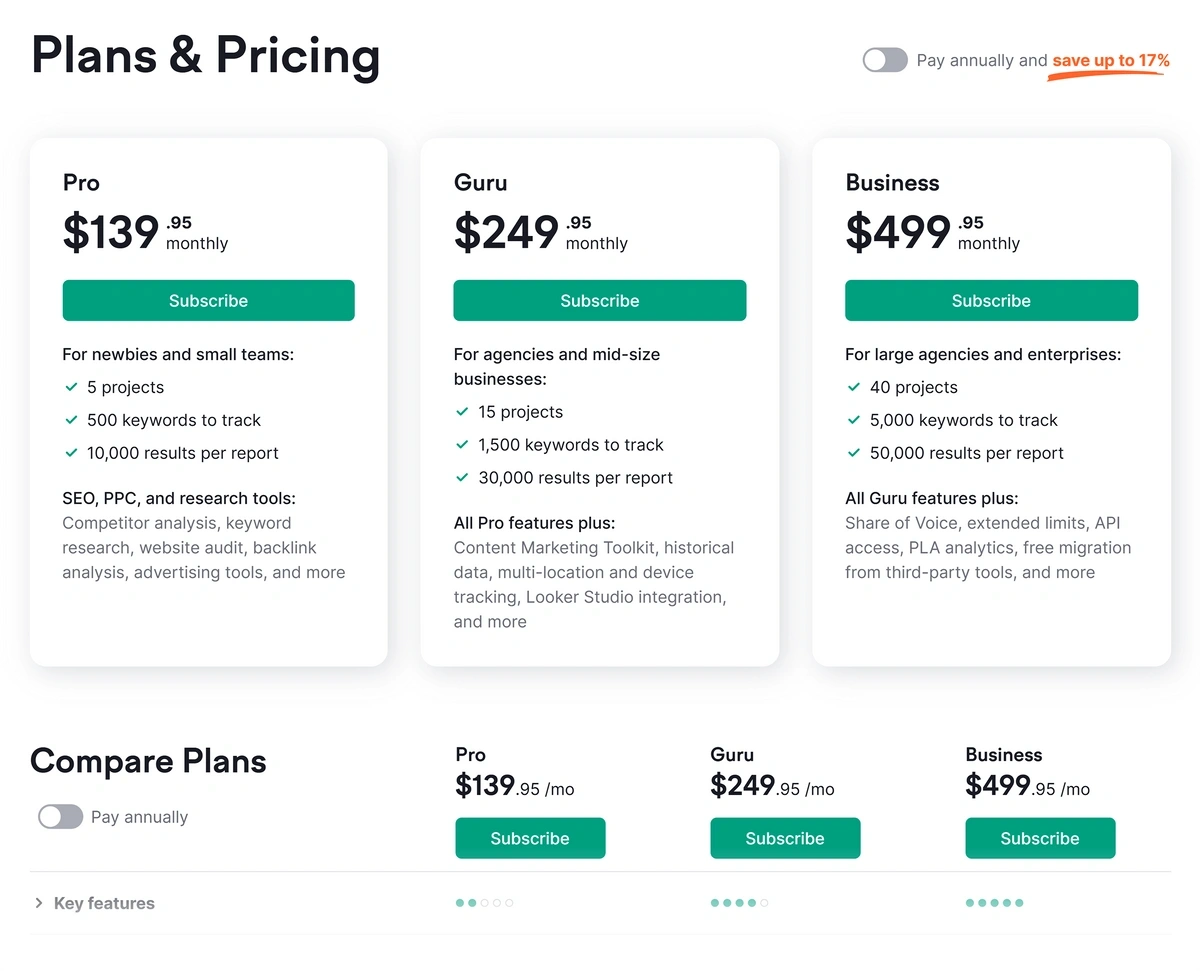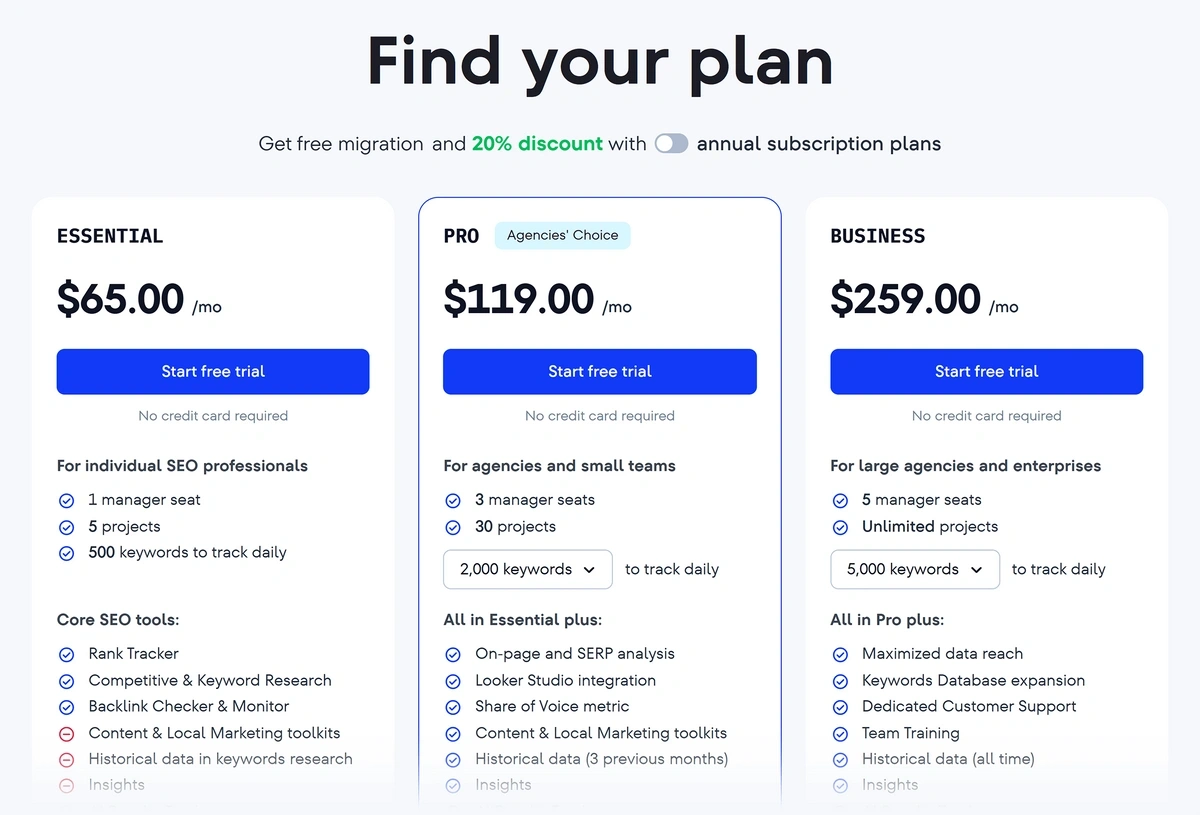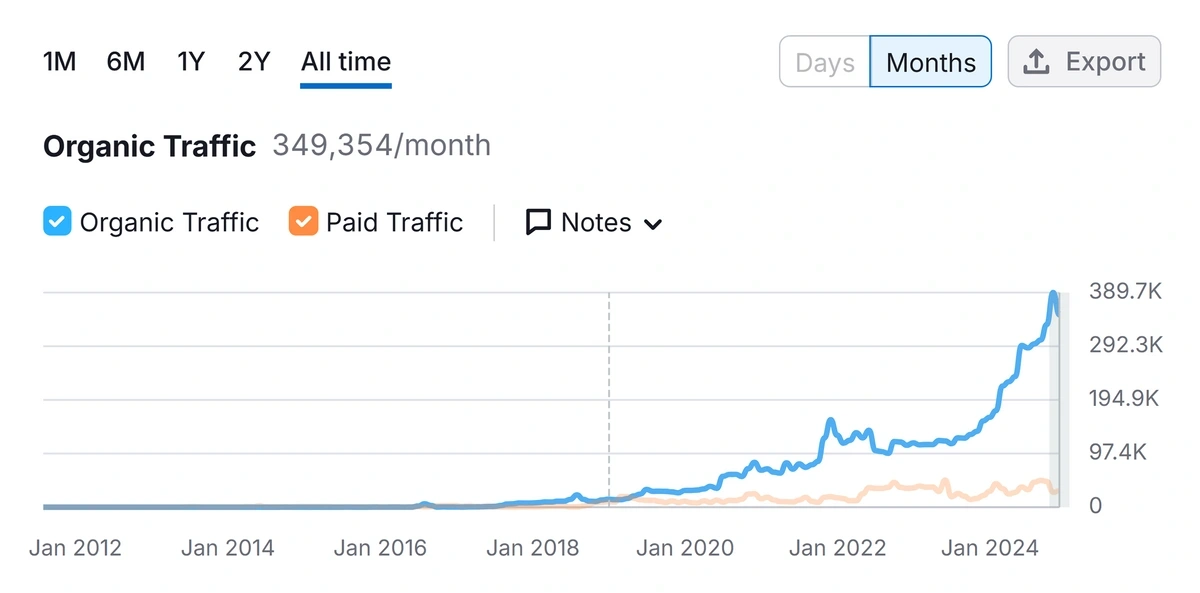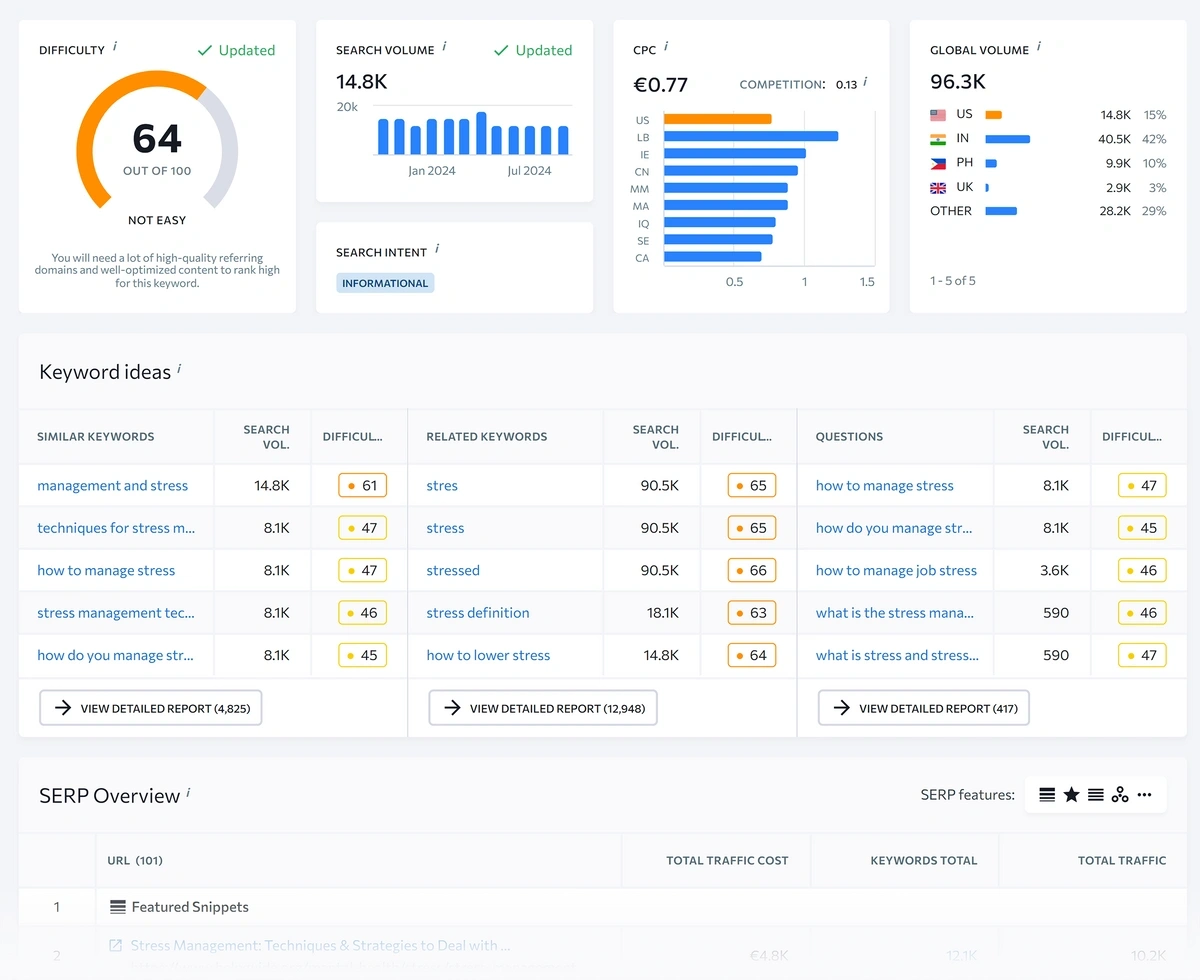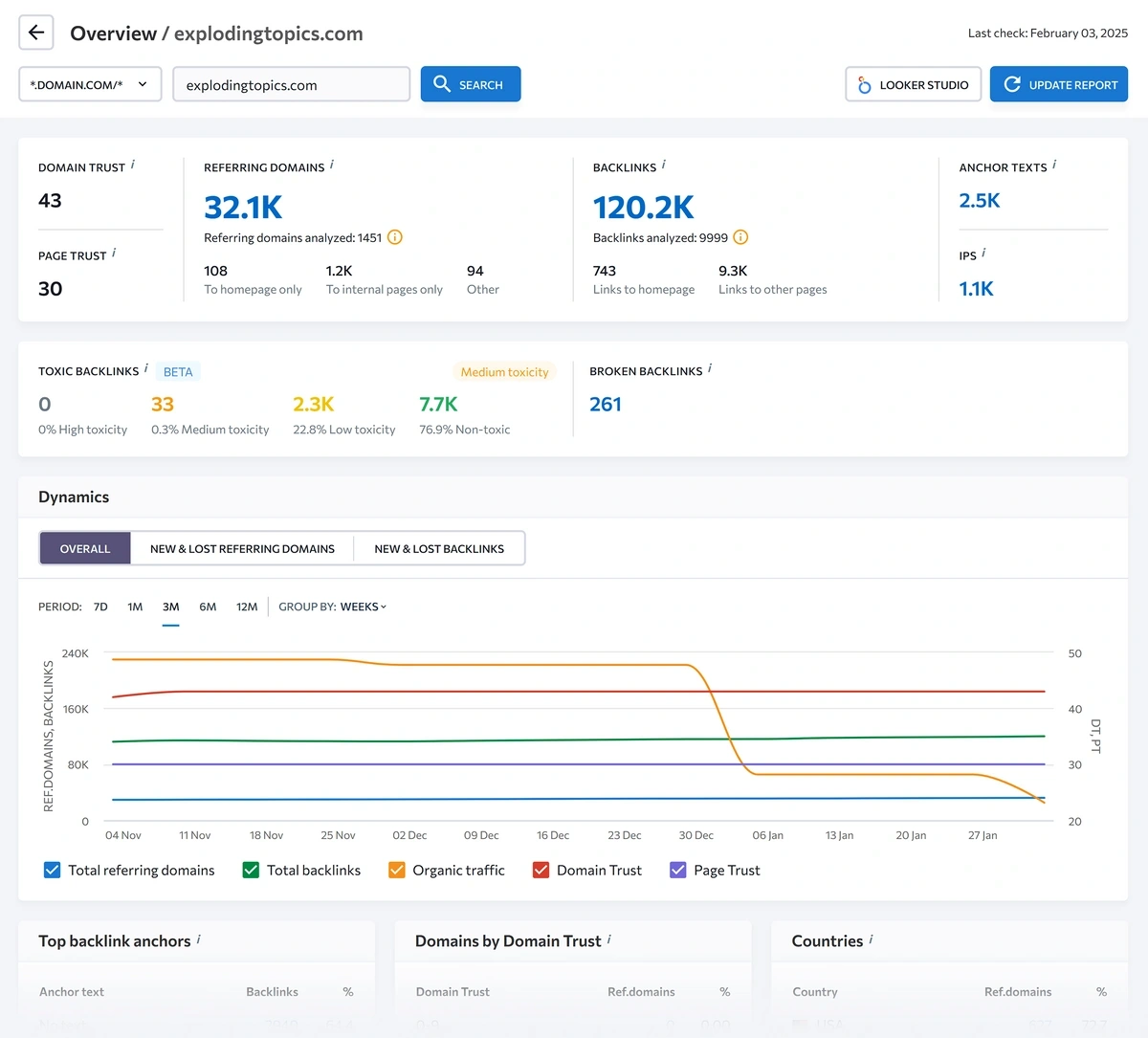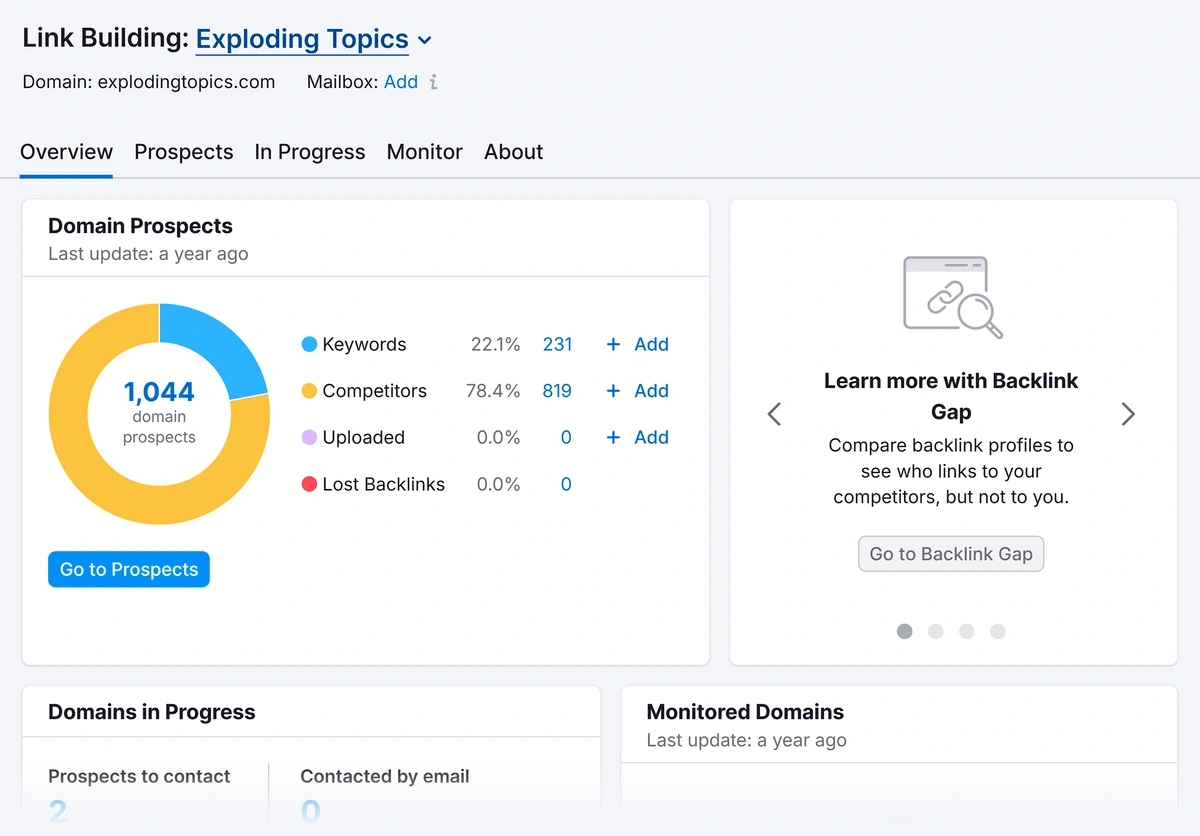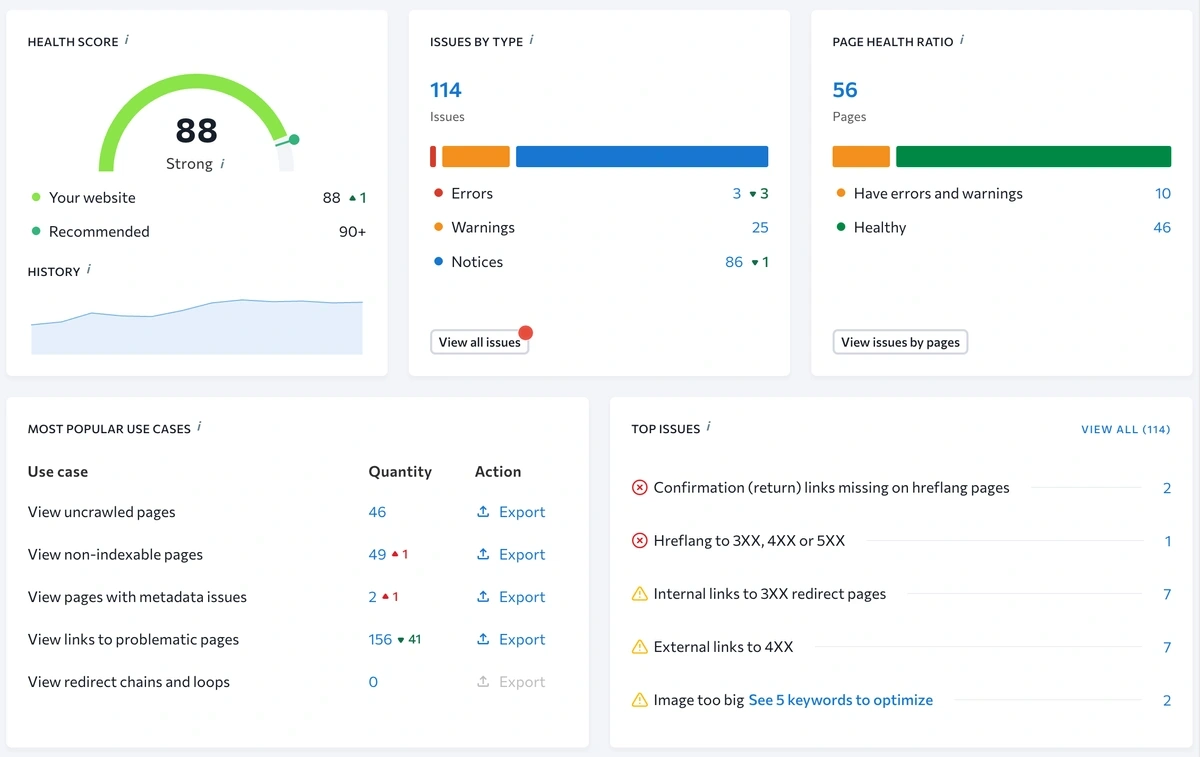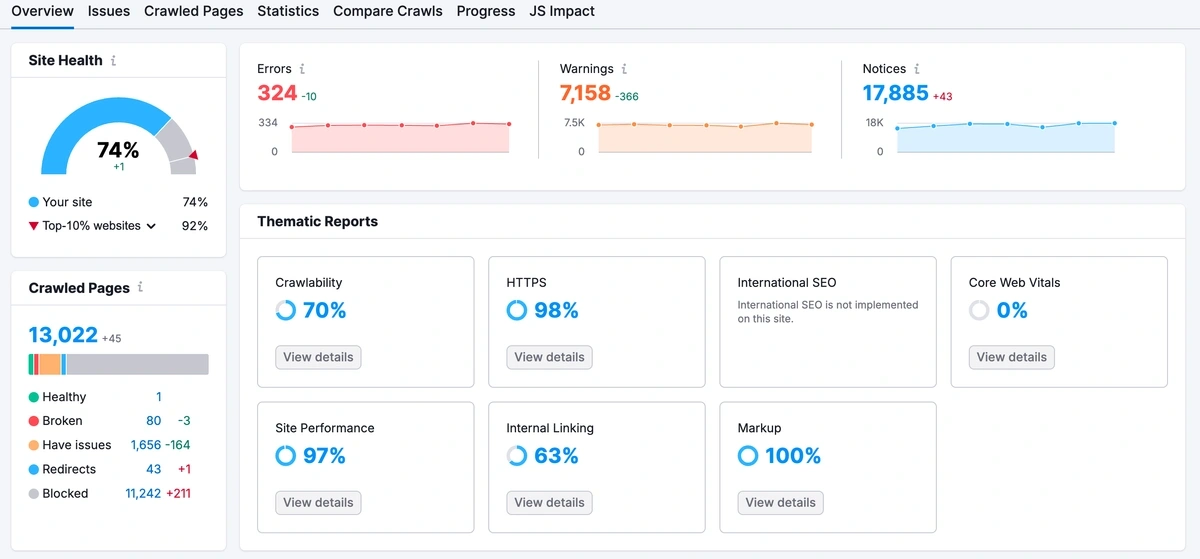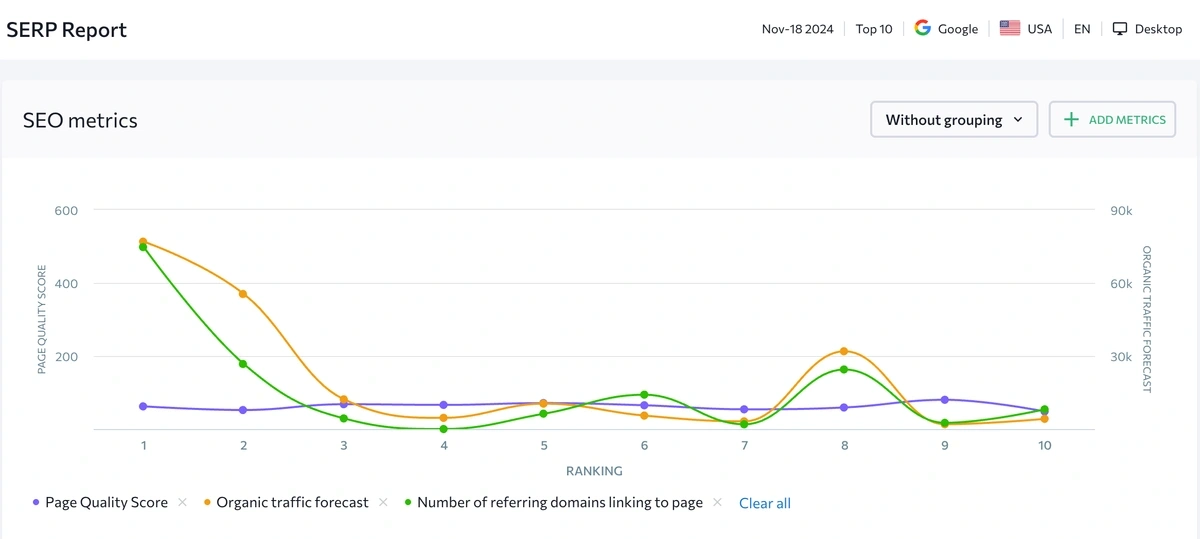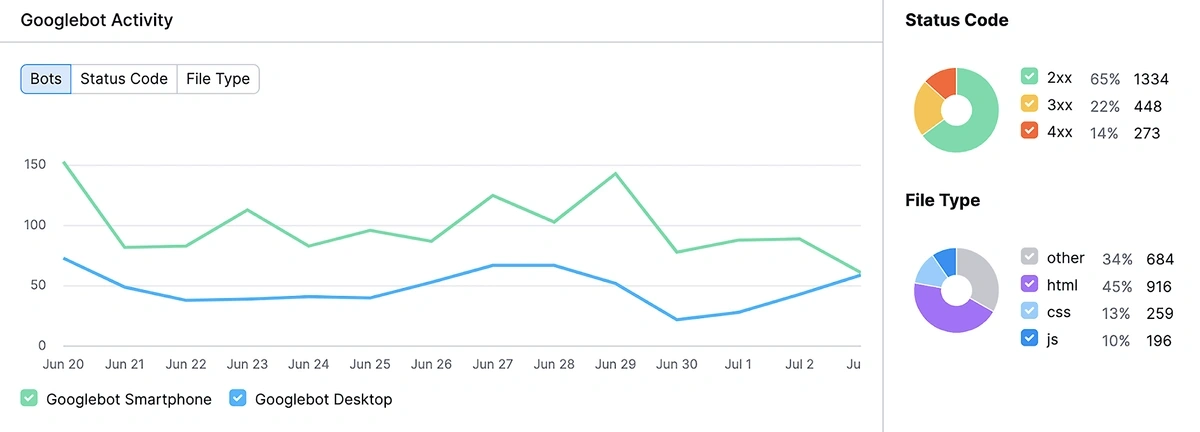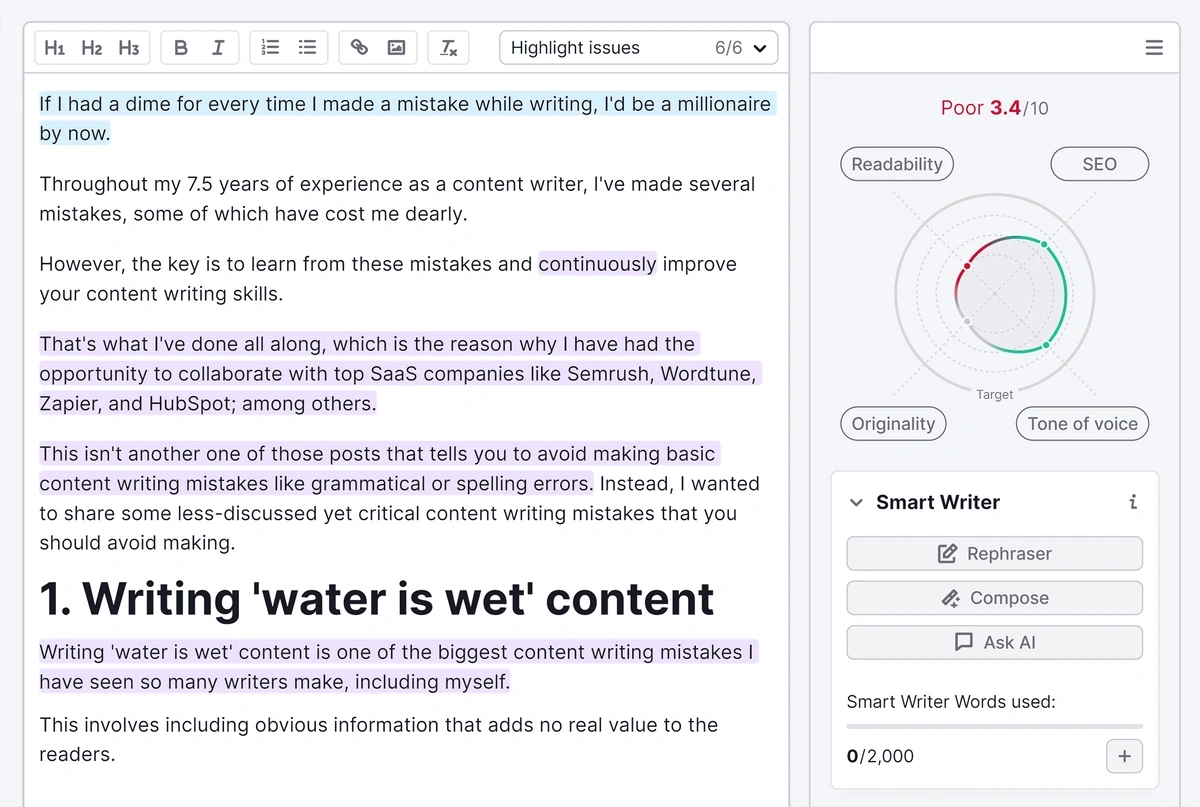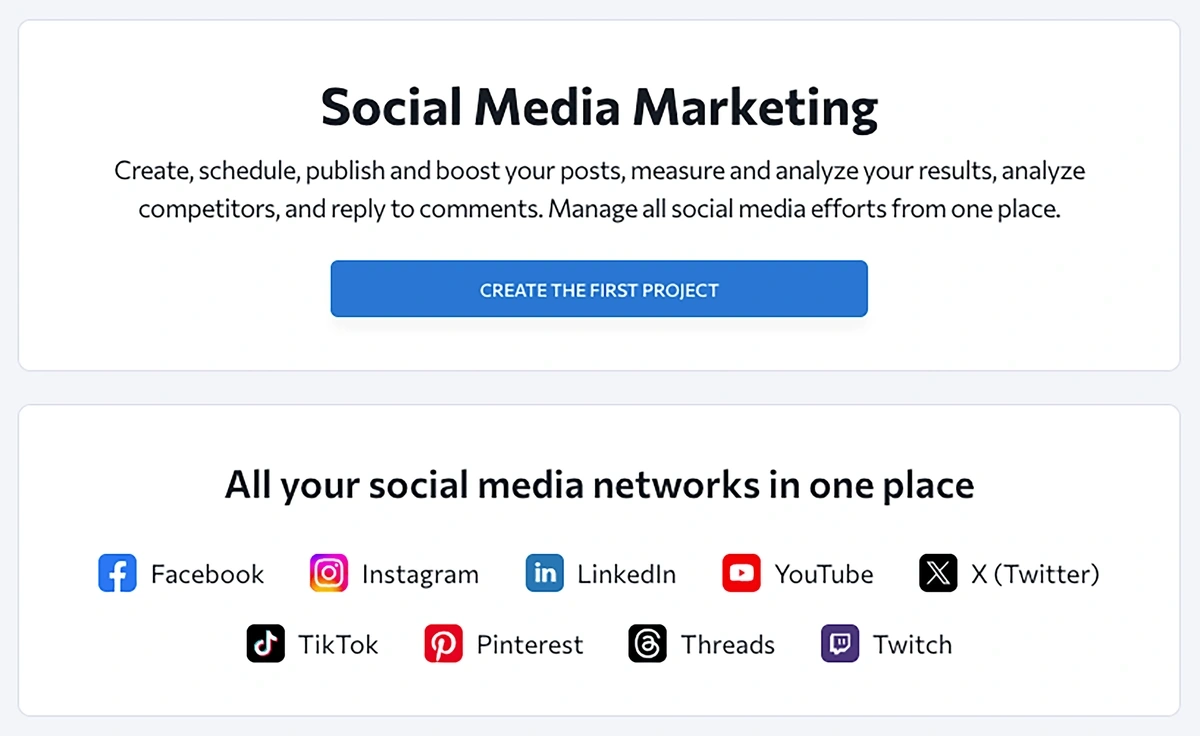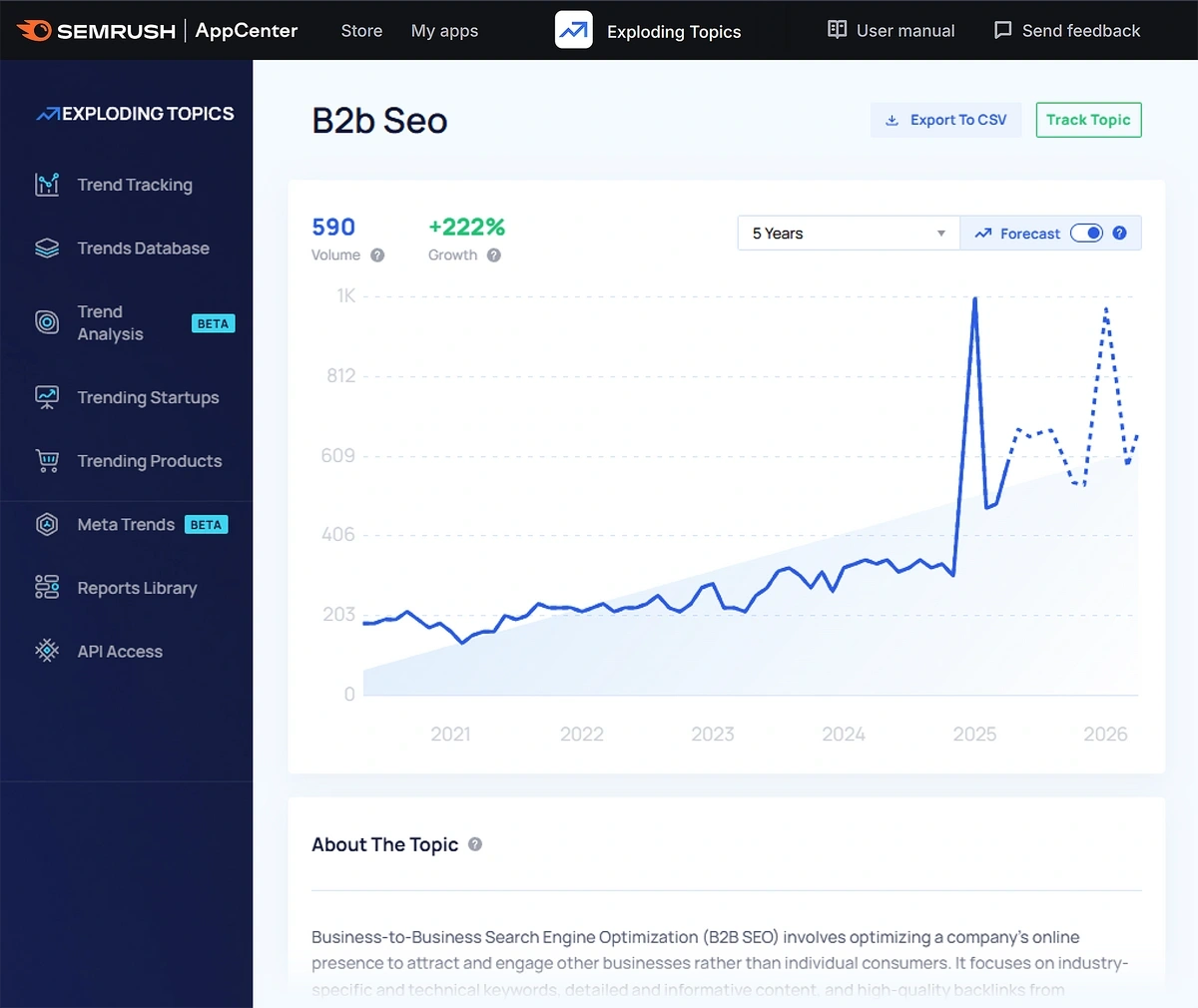Get Advanced Insights on Any Topic
Discover Trends 12+ Months Before Everyone Else
How We Find Trends Before They Take Off
Exploding Topics’ advanced algorithm monitors millions of unstructured data points to spot trends early on.

Keyword Research
Performance Tracking
Competitor Intelligence
Fix Your Site’s SEO Issues in 30 Seconds
Find technical issues blocking search visibility. Get prioritized, actionable fixes in seconds.
Powered by data from
SE Ranking vs. Semrush: A Side-by-Side Comparison for Marketers
Ask a search engine optimization (SEO) pro about their favorite keyword research tool and you'll get a ton of different answers.
If you ask me, though, I'll tell you this: I've used SE Ranking and Semrush extensively over the past five years, and both are strong options for any digital marketer. I've found, though, that Semrush outshines SE Ranking in a few key areas.
Let's take a closer look at how these two SEO tools compare.
Semrush Pros and Cons
I love that Semrush offers several set plans with clear allowances.
Semrush is very accurate. This is the biggest pro, in my opinion. I rarely have to refresh the Semrush database—typically, a lot of information pops up about any keyword I enter into the tool.
Unfortunately, though, Semrush is expensive. Paid plans start at more than $100 per month, so it's not in everyone's budget. Luckily, you can do quite a lot with a free Semrush plan.
Want to learn more about Semrush? Check out our detailed Semrush review.
Build a winning strategy
Get a complete view of your competitors to anticipate trends and lead your market
SE Ranking Pros and Cons
I used SE Ranking as my primary SEO tool for years and was generally pleased with it. The company offers affordable pricing plans, and I always found their customer support team to be very helpful.
The SE Ranking database isn’t quite as large as Semrush’s, but it gets the job done. SE Ranking found almost every keyword I ever wanted to research. I also found its keyword list building tool to be visually pleasing.
SE Ranking’s Content Marketing Tool is one of my least favorite parts of the platform. The app requires quite a bit of legwork to set up—you need to add in target links, add and remove keywords, and more.
Some content marketing managers may like this, as you get a lot of control over how a brief looks. But I felt that I had to jump through too many steps to generate a list of semantic keywords and check my text.
Read my complete SE Ranking review to learn more about how the platform works! And if you're interested in throwing Ahrefs into the mix, you can also read our SE Ranking vs Ahrefs review.
SE Ranking vs. Semrush Feature Comparisons
SE Ranking and Semrush have a lot of similarities, so let’s take a closer look at how each tool stacks up for things like competitor research, local SEO, content marketing, and more.
| SE Ranking | Semrush | |
| Free Plan | No | Yes |
| Historical SERP Data Available on All Plans | No | No |
| Competitor Research Tools | Yes | Yes |
| Keyword Research Tools | Yes, including a keyword rank tracker | Yes, including a keyword rank tracker |
| Backlink Analysis Tools | Yes, including gap analysis | Yes, including gap analysis |
| Site Audit Tools | Yes | Yes |
| Local SEO Tools | Yes, on select plans with add-on | Yes, on any plan with add-on |
| Content Marketing Tools | Yes, on select plans with add-on | Yes, on select plans |
| Other Notable Features | Website audit tools, AI Overview rank tracking, social media tools, agency reporting | SEO audit tools, ChatGPT response position tracking, trend forecasts, social media management tools, agency reporting, prospecting tools for link builders |
Competitor Research
The core competitor research tools found in SE Ranking and Semrush are very similar. After entering a domain, you can see information that includes:
- How trustworthy the site is
- Monthly organic traffic volume
- Total organic and paid search keywords
- Changes in traffic over time
- Top competitors in the organic SERP
- Other sites that link back to your competitor
SE Ranking's historical domain data goes back to 2020. Semrush shows you information that goes back much farther—in the example that follows, I’m able to see organic and paid traffic changes dating back to 2012.
Choose SE Ranking if: You don't need to see highly detailed historical data about a domain.
Choose Semrush if: You want to see as far back as possible when researching a top c competitor.
Keyword Research
There are 26.6 billion keywords in the Semrush database, compared to just 4.9 billion in the SE Ranking database.
While I never had any notable issues using SE Ranking to conduct keyword research, I like knowing that I have a high volume of information and ranking data at my fingertips with Semrush.
Get More Search Traffic
Use trending keywords to create content your audience craves.
SE Ranking offers its users two different tools for keyword research:
- The core keyword tool that shows you metrics like search volume, competition, and pay-per-click (PPC) rates
- A keyword grouper that can sort terms into similar clusters
Semrush, on the other hand, includes five different keyword research tools:
- Keyword Overview: This is a classic keyword research tool that shows you essential metrics about any term. You can customize it to show adjusted difficulty and position projections for any domain, though, which is super helpful.
- Keyword Magic Tool: This feature gives you keyword suggestions based on SERP feature, type of query, your goals, and more.
- Position Tracking: Once you find terms you want to use, monitor their changes with this tracker. You can track traditional search engines or see how a site performs for specific ChatGPT queries.
- Keyword Strategy Builder: This is Semrush’s answer to keyword clustering, and it’s good. In 15 minutes or less, I can get multiple complete content clusters—I’ve never used anything like the Keyword Strategy Builder, and it’s now one of the first tools I turn to in my SEO strategy workflow.
- Organic Traffic Insights: This tool lets you connect your Google Analytics and Google Search Console accounts to get more clarity around the top terms driving traffic to your site.
Choose SE Ranking if: It fits your budget best
Choose Semrush if: You plan to create a lot of SEO content. The Keyword Strategy Builder will make this process much smoother.
Backlink Audit
SE Ranking allows you to check your site’s backlink profile and search for potential backlink gaps when compared to another company.
The app delivers solid functionality in this area—if you’re mostly interested in checking the health of your backlinks or spying on a competitor’s, SE Ranking will serve you well.
While Semrush’s backlink checker offers the same features, they go one step further with their Link Building Tool. This is a way to find backlink prospects, complete with contact information.
Earlier in my SEO career, there was a point at which I was asked to launch a backlink strategy for a rather niche product, and I had no idea where to begin. Access to a tool like this one would have made my life a lot easier—and allowed me to speed up the process of getting live backlinks.
Choose SE Ranking if: You're more interested in monitoring backlink health than finding new links, and you prefer SE Ranking's other features.
Choose Semrush if: You want to find new high-quality link opportunities for your website.
Site Audit and Technical SEO
SE Ranking and Semrush are equally good when it comes to site audit and technical SEO features.
With SE Ranking, you'll get a detailed snapshot of technical errors, warnings, and notices requiring your attention.
The report is neatly laid out and it's very easy to digest.
Semrush has a very similar report, offering an intuitively categorized overview of your site's technical health.
This is a personal preference, but I enjoy Semrush more because it's easier to navigate to different parts of the report with the horizontal tabs.
In SE Ranking, your main access to other parts of the report is through the sidebar menu, which is quite cluttered.
But there are areas where SE Ranking has an edge over Semrush.
The SE Ranking SERP Analyzer tool is a great visual aid for seeing ranking correlations of top performing pages for a keyword.
These correlations don't always exist considering how complex modern Google search is. Singling out individual factors isn't going to help you see the bigger picture in many cases.
Regardless, it's a great feature that improves your analysis when there are any clear patterns in SERPs to observe.
While Semrush doesn't have a similar tool to SE Ranking's SERP Analyzer, it has something unique for site audits of its own: Log File Analyzer.
This tool is fantastic because it helps you check how crawlers are interacting with your website.
You'll be able to see exactly where your crawl budget is being spent by real crawlers. It also gives you clear picture of how often Googlebot is crawling specific pages on your site.
These insights are always helpful, but they'll rise in significance even more as AI-first search becomes more common.
That's because surfacing the right pages to Googlebot is vital if you don't want to lose out to competitors that might get better AI citations by simply being more accessible to crawlers.
Both Semrush and SE Ranking also have specialized AI SEO tools.
You can read our full Semrush AI Visibility Toolkit vs SE Ranking AI Search Toolkit review here.
Additionally, if you want to get the most value for your money, Semrush offers a Semrush One. It's a bundle that combines the best of the SEO toolkit with the AI Visibility toolkit to help you track exactly what you need.
Semrush One plans start at $165.17/month when you pay annually. You can check out an exclusive 14-day trial to spend more time getting to know the tools and features to know how they'll work for your site.
Choose SE Ranking if: You need standard simulated site audits and an easier way to visualize SERP patterns.
Choose Semrush if: You want standard site audits with easier navigation and insights complemented by real log file analysis.
Local SEO
SE Ranking and Semrush have similar local SEO tools. Both platforms let you:
- See how you rank in local SERPs and Google Maps results
- Update your business listings in various online directories
- Analyze and respond to customer reviews
- Improve your Google Business Profile (GBP)
- Schedule GBP posts
You can add these local SEO tools to any SE Ranking or Semrush plan, however, Semrush also lets you subscribe to its local SEO tools as a standalone service.
Choose SE Ranking if: You like the platform for other reasons, and you need an all-in-one SEO tool.
Choose Semrush if: You like this platform best, or you need just a Local SEO tool without other capabilities.
Want to Spy on Your Competition?
Explore competitors’ website traffic stats, discover growth points, and expand your market share.
Content Marketing
SE Ranking’s content marketing tool is available as an add-on to any plan. While it will scan the text you write and provide suggestions for semantic keywords and optimizations, at its core, it’s a content briefing tool. I find that the SE Ranking tool works best if you’re going to set up a brief, save it, and share it with a writer.
The main purpose of Semrush’s SEO Writing Assistant, though, is to give you direct feedback as you write. Simply plug one or two keywords into the tool and it’ll generate a complete list of semantic terms that can enhance your content.
The app will score your content and provide suggestions to improve your writing.
Choose SE Ranking if: You plan to create content briefs that you'll hand off to a writer.
Choose Semrush if: You want to quickly find semantic keywords and get an analysis on your own content. You should also choose Semrush if you are interested in the Guru or Business plan, as the content marketing tools are included at no extra cost.
Other Features
What’s the reporting like in SE Ranking and Semrush?
Both SE Ranking and Semrush allow you to create a variety of reports. You can choose to use these reports for the purpose of tracking metrics internally or share them with clients. Each tool gives you the option to white-label reports for clients, too, though you’ll need to pay extra for this feature.
Do SE Ranking and Semrush support social media management?
Yes! If social media marketing is an important part of your strategy, you can manage campaigns directly from either SE Ranking or Semrush.
SE Ranking works with Facebook and X accounts, while Semrush connects to:
You can also post to your GBP with Semrush’s social media tool, regardless of whether you use the platform’s local SEO tools.
Can SE Ranking and Semrush help me find trends?
Trend spotting and forecasting is one area where Semrush really excels. There are two tools available for trend tracking in Semrush: Daily Trends and Exploding Topics.
When you subscribe to an Exploding Topics Pro plan, you can access our trend data through your Semrush account.
How does Semrush help analyze customer journey messaging?
Semrush users can buy an optional ImpactHero subscription that uses AI to uncover information about your buyer’s journey stages—and then analyze marketing copy to determine how effective it will be with that target audience.
Which is the easiest SEO platform to use?
If it’s your first time using an SEO platform, there’s going to be a bit of a learning curve—there’s no way around it. That said, I find Semrush to be nice for beginners as there are user-friendly tool tips and suggestions that pop up as you use various features for the first time.
How do SE Ranking and Semrush compare on API integration?
Semrush offers more robust API capabilities, especially in its Business tier, with higher request limits and more endpoints. SE Ranking's API is more limited and primarily focused on rank tracking and basic data retrieval.
SE Ranking vs Semrush Pricing
| SE Ranking Plan Type | SE Ranking Price | Semrush Plan Type | Semrush Price |
| Essential | $52.00 | Pro | $117.33 |
| Pro | $95.20 | Guru | $208.33 |
| Business | $207.20 | Business | $416.66 |
| Additional user seat | $16–$48 each | Additional user seat | $45–$100 each |
| Agency Pack | $20 | My Reports Suite | $10–$20 per report |
| Content Marketing | $23.20–$79.20 | Content Marketing Platform | Included in Guru and Business plans |
| Local Marketing | $18.40–$920.00 | Semrush Local | $50–$60 per location |
| Social Media | $5.20–$26.00 | Social Media Management | $19.99–$29.99 |
| Semrush Traffic & Market | $289 per user | ||
| ImpactHero | $200 | ||
| Additional Apps | Price varies |
Note: Unless otherwise noted, all listed SE Ranking and Semrush prices are per month with annual billing.
Final Verdict: Which is the Best SEO Tool?
While both SE Ranking and Semrush are good platforms, Semrush wins the title of best SEO tool thanks to its vast feature set and app center.
The ability to see Exploding Topics trend data directly in Semrush is great, too—by combining our trend forecasts with Semrush’s extensive historical SEO data, you can get a great picture of how any market is evolving.
Try out Semrush and Exploding Topics Pro for free today and see how the two work together to elevate your marketing.
Grab your extended Semrush free trial with our exclusive promo code—then take advantage of a 14-day Exploding Topics trial at the same time.
Stop Guessing, Start Growing 🚀
Use real-time topic data to create content that resonates and brings results.
Exploding Topics is owned by Semrush. Our mission is to provide accurate data and expert insights on emerging trends. Unless otherwise noted, this page’s content was written by either an employee or a paid contractor of Semrush Inc.
Share
Newsletter Signup
By clicking “Subscribe” you agree to Semrush Privacy Policy and consent to Semrush using your contact data for newsletter purposes
Written By


Emily is a freelance content writer at Exploding Topics. A former news correspondent, she has over 15 years' experience creati... Read more




